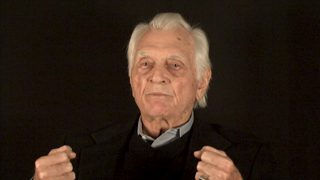6:06 | As he floated to the ground after bailing out, Jack Lemonds looked up and saw the B-24's make their turn to head back to England. What would happen to him, he wondered? As he gathered his chute, three German farmers tried to do him in, but he was saved by an enemy soldier. It would not be the last time. (This interview made possible with the support of PHILIP J. O'NEILL.)
Keywords : Jack Lemonds B-24 Liberator Prisoner Of War (POW) parachute (chute) bail out Braunschweig Germany blackjack farmer German pitchfork Schutzstaffel (SS) motorcycle sidecar watch dog tags doctor hospital

Jack Lemonds was drafted in 1943 and headed to the luckiest basic training site of the war, Miami Beach. That was the place where Army Air Corps recruits began their journey. A year later, he took his first ride in a B-24 Liberator. (This interview made possible with the support of PHILIP J. O'NEILL.)
As a group of new B-24 crews readied to make the flight to England, one of them crashed into a mountain in New Hampshire. Undeterred, waist gunner Jack Lemonds and a host of others donned their heated suits and made the long, cold flight. They didn't know it yet, but their first mission would be on the the most important day of the war. (This interview made possible with the support of PHILIP J. O'NEILL.)
They were anxious. The first mission for many of the B-24 crews in England was D-Day. Waist gunner Jack Lemonds was awed by the spectacle of hundreds of ships bombarding the Normandy shore as he flew towards France. Later, when the enormous cost in lives became known, he felt fortunate to have been in the air, not on the ground. (This interview made possible with the support of PHILIP J. O'NEILL.)
After a three day pass to London, B-24 crew member Jack Lemonds returned to his base to find out a good friend's crew had been shot down. No one knew if they survived, but, through a twist of fate, he would see his friend again. He remembers a mission of his own that was particularly hazardous due to a swarm of German fighters. (This interview made possible with the support of PHILIP J. O'NEILL.)
Jack Lemonds was over Braunschweig, Germany when his B-24 was split in two by flak. As others in the plane succumbed to flames, he managed to tumble out, attaching his parachute as he fell. In the front half of the plane, the pilot struggled in vain to control the descent until the whole thing blew. (This interview made possible with the support of PHILIP J. O'NEILL.)
His German captors took care of his wounds and then Jack Lemonds was taken to Frankfurt for interrogation. The officer who questioned him was the spitting image of a post war cinema stereotype. All he got was name, rank and serial number. (This interview made possible with the support of PHILIP J. O'NEILL.)
The first POW camp was near the French border, but when the Allies began to push across France, Jack Lemonds and many others were moved to another camp up in Poland. On the way, he saw the terrific devastation Allied bombing had caused all across Germany. (This interview made possible with the support of PHILIP J. O'NEILL.)
The Russians were close enough that the American POW's could hear the fire in the distance. Their guards roused them all and put them on the road in a forced march, leaving their camp in Poland and heading for Germany. It was seventy nine days of freezing cold out in the open, with very little food. (This interview made possible with the support of PHILIP J. O'NEILL.)
After a forced march of at least 500 miles through Poland and Germany, the POW's reached the Elbe River. There, the guards made the decision to surrender when they saw the American forces on the other bank. Jack Lemonds had survived and, in a nearby office building, picked up a memento that marks his liberation day. (This interview made possible with the support of PHILIP J. O'NEILL.)